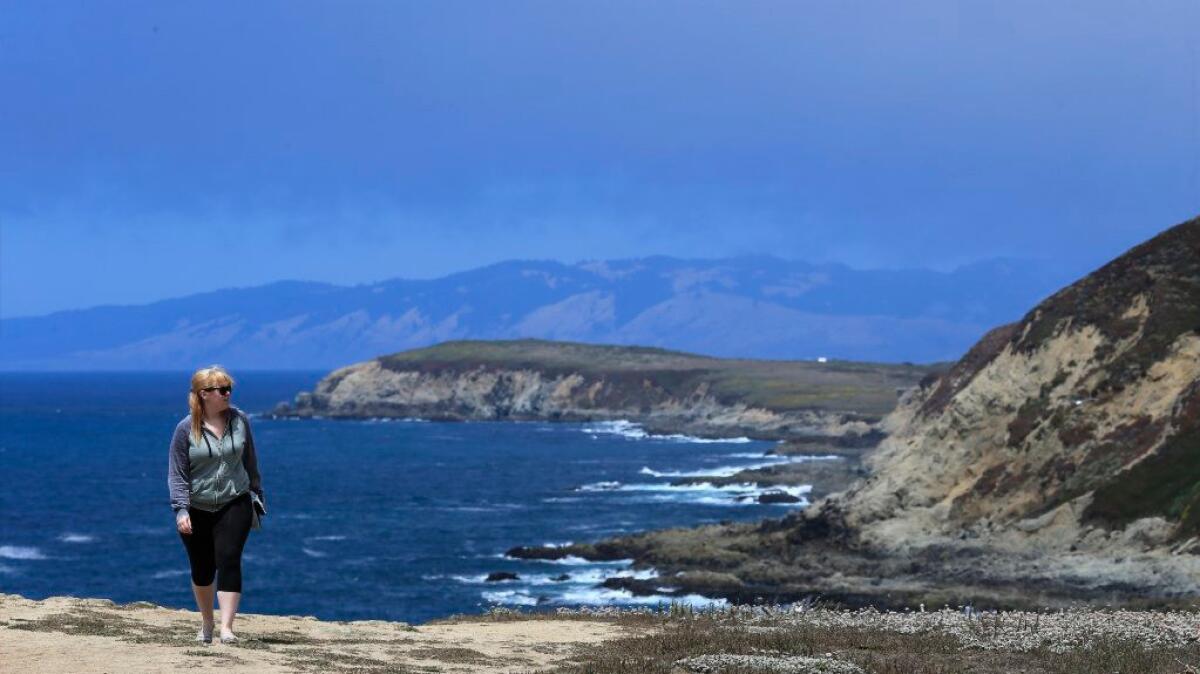Bill to ban private communications by California’s coastal commissioners gets sidetracked

A bill to ban behind-the-scenes communications by members of the California Coastal Commission stalled in the Assembly on Monday after a committee report concluded that the measure might cost the powerful land use agency hundreds of thousands of dollars annually.
If passed, the legislation by state Sen. Hannah-Beth Jackson (D-Santa Barbara) would prohibit commissioners from having so-called ex parte communications with developers, lobbyists, environmentalists or anyone else with an interest in the agency’s business.
The bill easily won approval in the state Senate earlier this year, but now will automatically be sent to the Assembly’s suspense file, where measures that might cost the state $150,000 or more per year are shelved at least temporarily.
While on hold, the measures are evaluated further and prioritized by legislators for possible removal from the suspense file.
Lots of sunshine has been put on this issue ... I will keep fighting.
— California state Sen. Hannah-Beth Jackson
If the bills are not sent back to the Assembly on Aug. 11, they cannot be reintroduced until next year.
“I’m a little bit surprised,” said Jackson, the bill’s author.
In the past, she said, this sort of bill has not been put into this holding file.
She said that she remains optimistic, in part because of growing public concern about perceived lack of transparency at the Coastal Commission.
“Lots of sunshine has been put on this issue,” she said, adding: “I will keep fighting.”
Ex partes are private communications between a coastal commissioner and an interested party that could influence a decision. They can involve telephone calls, face-to-face meetings, emails or other written material.
Jackson has said a ban is necessary to promote open government, remove the possibility of backroom deal-making and help restore confidence in the commission since Executive Director Charles Lester was fired in February with little public explanation.
A new report by the Assembly Appropriations Committee stated that the financial impact of Jackson’s bill was unknown. However, the analysis stated that there might be cost pressures, possibly in the hundreds of thousands of dollars, to hire extra staff to gather information from interested parties for commissioners.
Kealii Bright, the deputy secretary for legislation at the state Natural Resources Agency, prepared the financial analysis for the report. He said the equivalent of six positions might need to be hired at an annual cost of $150,000 each in pay and benefits.
The analysis by the Natural Resources Agency supported the argument by some commissioners: that ex parte communications are a valuable source of information for commissioners and provide the public access to them.
Supporters of the ban dispute the agency’s findings, noting that at least four other studies by the Coastal Commission and legislative committees indicate the bill would have no financial impact.
The Coastal Commission and the Senate Appropriations Committee both studied Jackson’s bill and saw no major costs — and in some cases found there could be savings.
In addition, reports by the Assembly and Senate appropriations committees found no fiscal impact for similar, and ultimately unsuccessful, legislation in 2004 that called for a limited ban on ex partes at the Coastal Commission.
“It is very frustrating that this far into the legislative process, and after both the Coastal Commission and the Senate Appropriations have determined the bill would have no fiscal impact, that suddenly a fiscal impact is being created in an apparent effort to kill the bill,” said Amy Trainer, deputy director of the California Coastal Protection Network.
Current and former coastal commissioners also question the value of ex parte communications and whether extra staff would be necessary if they were banned.
“I have never learned anything in an ex parte communication that I didn’t learn through staff reports and the public hearing,” said Mary Shallenberger, who has served on the commission for more than a decade.
In addition, Shallenberger and Jackson said there is no reason to hire additional staff members because they too would be banned from doing ex parte communications to gather information for commissioners.
Former commissioner Sara Wan agreed.
If the measure passed, she said, the amount of information commissioners would gather before making a decision would not be different.
“In essence what they are saying is that commissioners rely on agents or lobbyists to get their information,” Wan said.
Twitter: @LADeadline16
ALSO
Coastal Commission slapped with 4 lawsuits over alleged secret communications
California’s coast: How we come to care and why we sometimes go wrong
Billion-dollar Beverly Hills development challenged because of ex-mayor’s lobbying
More to Read
Sign up for Essential California
The most important California stories and recommendations in your inbox every morning.
You may occasionally receive promotional content from the Los Angeles Times.











